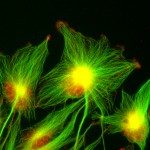Lien vers Pubmed [PMID] – 25218948
Exp. Cell Res. 2014 Nov;328(2):240-8
The centrosome position is tightly regulated during the cell cycle and during differentiated cellular functions. Because centrosome organizes the microtubule network to coordinate both intracellular organization and cell signaling, centrosome positioning is crucial to determine either the axis of cell division, the direction of cell migration or the polarized immune response of lymphocytes. Since alteration of centrosome positioning seems to promote cell transformation and tumor spreading, the molecular mechanisms controlling centrosome movement in response to extracellular and intracellular cues are under intense investigation. Evolutionary conserved pathways involving polarity proteins and cytoskeletal rearrangements are emerging as common regulators of centrosome positioning in a wide variety of cellular contexts.

